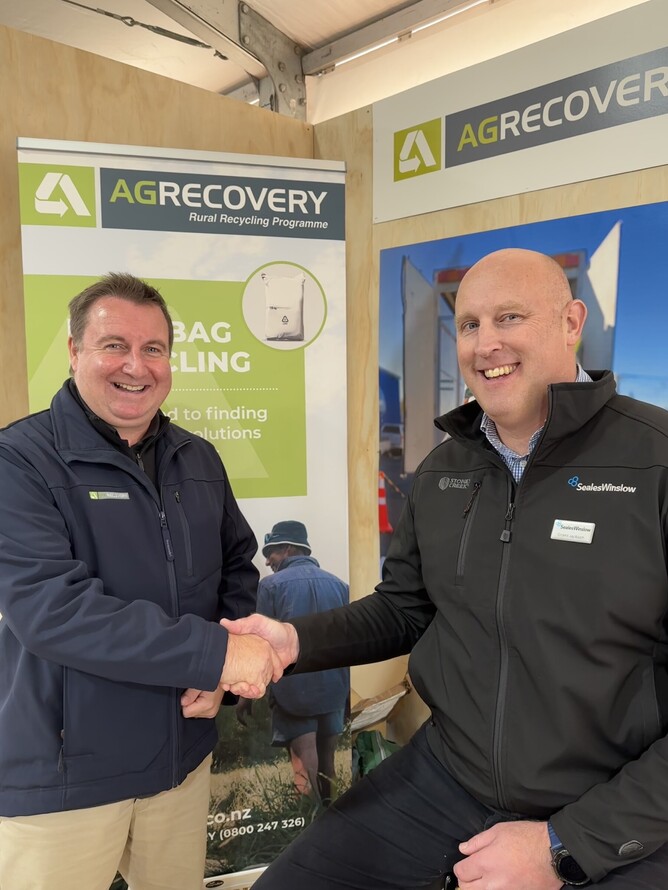More than one million calf feed bags each year could be saved from landfill as SealesWinslow becomes one of the first animal nutrition companies in New Zealand to join Agrecovery.
From 01 July this year, farmers will be able to recycle SealesWinslow’s 20kg and 25kg feed bags through Agrecovery at no cost. If every bag was recycled, it would remove more than 1 million or 85 tonnes of calf feed bags going to landfill each season.
The initiative is one way SealesWinslow is helping farmers reduce waste to meet dairy company requirements and environmental regulations. The news is timely with an industry wide product stewardship scheme for agricultural plastics expected to come into force in 2024 as part of the Ministry for the Environment’s Waste Minimisation Act.
Along with a number of other dairy companies, Fonterra has also signalled that participation in the Agrecovery scheme will be a priority for its farmer suppliers, making it part of its Co-Operative Difference programme, which pays farmers a premium for achieving targets around milk quality, sustainability, animal welfare, and health and safety.
“As our global customers continue to demand sustainably produced dairy products and we take steps to do the right thing by our environment, our entire agricultural sector is stepping up to find innovative solutions to minimise waste. This responsibility rests with all of us, not just our farmers,” says SealesWinslow General Manager Grant Jackson.
“SealesWinslow is an industry leader, and we have a responsibility to step up and play our part. We take our social responsibility seriously and this includes minimising our supply chain footprint and reducing the liability on our farmer customers. Farmers already have a lot on their plates, so we want to make the recycling process as easy as possible. We are proud to partner with Agrecovery to help make it happen.”
Agrecovery National Scheme Manager Felicity Mitchell says the company’s Woven PP Product Stewardship Scheme plays a crucial role in providing New Zealand farmers with a practical and responsible solution for managing this type of plastic packaging.
“The success of this voluntary scheme relies heavily on the leadership of the scheme’s founding brands. These companies have all shown commendable commitment by joining the scheme from the outset and taking responsibility for the plastic packaging they put into the sector,” says Felicity.
“Their active participation enhances the scheme’s overall effectiveness and reach by inspiring other brands to join. It also highlights the importance of collaboration and shared responsibility in addressing plastic packaging management challenges.”
The company’s partnership with Agrecovery is part of a larger sustainability project by SealesWinslow to introduce an eco-friendly packaging solution for its 20kg bagged calf feed from the 2024/25 season.
Our new bag is 14 per cent lighter, which means SealesWinslow will reduce the amount of plastic it imports for the 2024/25 season by more than 18 tonnes. This is no small feat with Agrecovery currently processing around 500 million tonnes of plastic each year.
Our new bag will also be seamless and completely recyclable. Its design allows more bags to fit inside export containers, reducing sea travel by 11,000km per annum.
“Transport is a large contributor to the greenhouse gas life cycle of a bag manufactured overseas so this increased shipping efficiency will further reduce our greenhouse gas emissions as a business,” says Grant.
“We want to reassure our farmer customers that the new packaging will have no negative implications on bag performance, strength or product quality. In fact, testing has proven that our new bags are even stronger than the ones we currently use.”
Grant says through its nutrition solutions SealesWinslow is already helping farmers reduce their nitrogen and carbon footprints.
“Helping farmers reduce waste by front footing the transition to recyclable bags is another way we can make a difference.
“We have a plan in place to give us visibility of our environmental footprint across our entire supply chain. We will keep making changes to the way we work so we can reduce that impact where it makes good business sense.”
